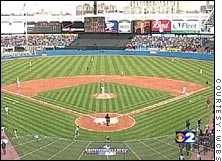
NEW YORK (CNN/Money) -
Forget Alex Rodriguez or efforts to trade for Randy Johnson. Forget the zillion-dollar television deal.
If you're worried about the Yankees' revenue advantage over other baseball teams, the news that should worry you the most is that the team is close to announcing plans for a new stadium.
Reports say the Yankees are proposing to foot the cost of the $700 million-plus stadium. But experts in the field say a new stadium is likely to produce more money for the Yankees, even though the team is already expected to draw nearly 4 million fans to their current home this season.
Yankees officials aren't giving details other than to say they continue to plan for a new home.
While the team would probably not be able to draw as many fans in a new stadium, which is expected to hold about 50,000 rather than the 56,000 seating capacity in the House that Ruth built, the Yankees will dramatically increase the number of luxury suites available.
That has been one competitive disadvantage the Yankees faced compared to teams playing in newer parks.
In addition, improved sight lines at a new stadium should lead to increased revenue from ticket sales since there will be a greater percentage of "good seats" for which the Yankees could charge higher prices.
 |
|
| The Yankees can afford to pay for a new $700 million stadium and still see the team's revenue increase. |
Philadelphia's new Citizen's Bank Park, for example, had a 51 percent increase in average ticket price this year, according to Team Marketing Report, even though the pricing of the different classes of seats often didn't climb that much. The club seat in the new park is $90, up from $80 last year at Veterans Stadium. But there are more than twice as many club seats in the new park.
The Yankees also will be able to significantly increase concession sales with far more selling space than is available in the current park, which opened in 1923 and was renovated for a 1976 reopening.
All things considered, the Yankees' overall revenue could get a nice bump of about $30 million to $50 million a year. And since the Yankees have to share 34 cents of every dollar in local revenues with the rest of Major League Baseball, that should be good news for the other 29 teams.
Less for other teams
But under the game's current economic structure, other teams could wind up with a lower cut of money from the Yankees, at least in the short-run. Here's why.
| SportsBiz
|

|
| Click here for SI.com sports coverage
|
|
|
|
The Yankees will have to pay debt service on bonds that it will sell to finance the new park. And the team will be able to deduct these and other costs associated with building a new stadium from the local revenue pool they have to share.
"For baseball in the short term, the Yankees will have more money. Everyone else will have a little bit less," said Mark Rosentraub, dean of the college of urban affairs at Cleveland State University and an expert in stadium economics.
It used to be teams went shopping for new stadiums when their attendance was down and they thought they could get a boost from a local government to build a new park. But the Yankees and the St. Louis Cardinals, who are in the process of building their own new privately-financed park, are leading the way in the new round of stadium building by successful teams, paying for the park themselves because they know it makes economic sense, even without the handout.
| Related columns
|

|
|
|
|
"The primary reason you're seeing more self funding is that the easy deals with the local governments are pretty much done," said sports consultant Marc Ganis, who has worked on a variety of stadium plans, although not the new Yankee Stadium. "We don't have local government budget surpluses any more. It takes more creative financing."
Ganis said the savings on revenue sharing that come from deducting stadium costs is one of the reasons it makes economic sense for teams to pay for new stadiums themselves.
Pressure to keep spending
Of course there's one way these plans fall apart quickly for the Yankees -- that is if the team starts to lose. Losing can kill attendance in a hurry, as teams in Milwaukee, Detroit and Pittsburgh found out.
The allure of their new parks quickly wore off when those teams continued to struggle on the field. So the Yankees have even more incentive than they did before, as well as more resources, to put the best team money can buy on the field.
A design of the new field has yet to be released. But the one thing we can be certain of is that it will not include a level playing field for the other 29 teams.

|

